At the heart of the digital revolution is artificial intelligence now. It is affecting industries and redrawing the very way in which businesses and people interact with technology. One industry where AI has played an important role is the search engine industry.
The entrance to search engines has long been considered the portal for information. The integration of AI into these search engines has raised them from being just traditional query-based tools. AI helps understand user intent and deliver contextually relevant results. Its integration is reshaping the way you search for deeper insights and more meaningful interactions.
Microsoft’s Bing serves as the finest example of this development. This development has become a turning point for the search engine’s success. With AI, Bing has evolved from an underdog to a highly competitive search engine. This evolution has not only altered its standpoint but also elevated it to the top of the market.
In this blog, you are going to explore the exciting journey of Bing’s transformation into an AI-driven search engine. Discover its advanced features and user-centric innovations while exploring the broader implications of knowing what is Bing’s AI.
1- Bing’s AI Journey- From Underdog to Powerhouse
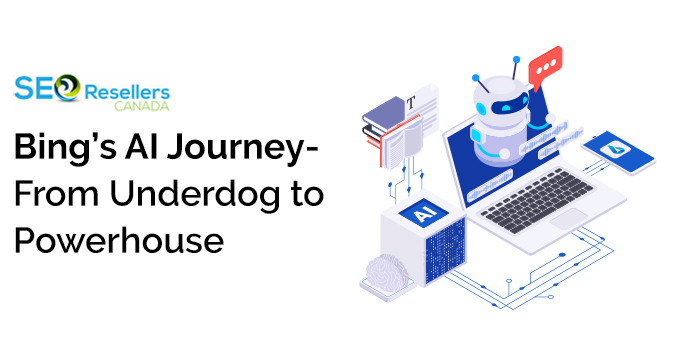
Microsoft’s Bing entered the search engine market in 2007, dominated by Google, with the aim of creating its presence. Despite continuous improvements, it failed to gain a significant market position. A key transformation occurred in February 2023 when Bing integrated AI-powered features, marking a significant shift in its strategy. This integration led to remarkable milestones, including surpassing 100 million daily active users. At the start of 2025, this search engine saw an increase in traffic by 19 million views with a traffic value of $3.6M.
With AI incorporated into it, Bing has now changed from the most traditional search engine to a dynamic digital platform powered by AI. Bing has dramatically improved the search experience to be more personalized and efficient for users. This, on its own, improves user engagement and creates new opportunities for businesses and digital marketers.
Understanding Bing’s AI can be one way for an SEO company to up its online game. With AI shaping the future of search, it is crucial that marketers are updated on these developments to efficiently use such tools for marketing.
2- Factors Driving Bing’s AI-Powered Growth
Bing’s AI-driven transformation is supported by innovations that prioritize user satisfaction, dynamic functionality, and a distinct competitive edge in the search engine sector.
2.1- User-Centric Innovation
Bing’s new AI functionality has redefined the search experience to identify personalization and contextual understanding. Algorithms from AI analyze user preferences and their history when searching, ensuring that results are tailored to the individual needs of users. Such an approach maximizes relevance and saves time while making Bing more intuitive in use. Advanced contextual understanding means that Bing now understands the intent behind complex queries and delivers precise, insightful answers that make the whole search experience easy.
2.2- Dynamic Functionality
The use of creative and interactive features has characterized Bing’s evolution into an AI-powered digital platform. From producing creative text formats such as poetry, code, and screenplays to providing seamless language translation capabilities, Bing caters to diverse user requirements. These dynamic functionalities reflect Bing’s commitment to versatility, enabling it to adapt to the constantly changing demands of the digital era.
2.3- Advantage
Bing’s AI innovations are what separates Bing from competitors, such as Google. As it focused on user-centric features and dynamic offerings, Bing marketed itself as a forward-thinking search engine that did not rely merely on information retrieval. AI-powered tools enhanced the engagement of users and created new prospects for SEO strategy and content marketing. As a result, Bing stood ahead in the evolving competitive marketplace of search engines.
3- Enhanced Search Experience: Redefining User Interaction
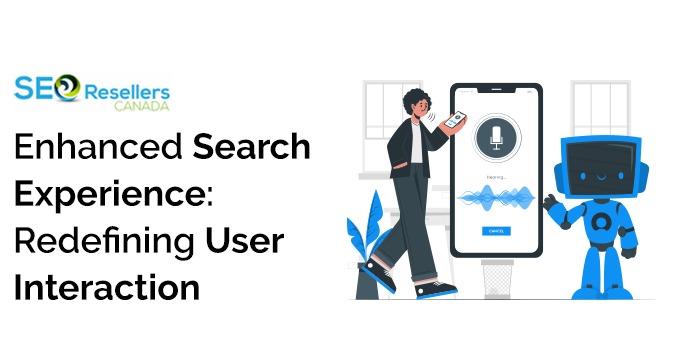
Bing’s AI development is redefining the user interface with search as it delivers a more intuitive and seamless experience to the user.
3.1- Natural Language Comprehension
Bing AI has perfected the art of natural language processing. It can interpret complex queries and conversational searches. Its ability to understand nuanced questions and deliver context-aware results is what takes Bing search AI from simply matching keywords to truly understanding the intent of a user. For instance, rather than generic answers, Bing delivers tailored results that address specific queries effectively. This conversational capability makes finding information effortless, even for users with intricate or multifaceted search needs.
3.2- User-Friendly Interface
The integration of AI has also helped simplify and streamline Bing’s user interface, as the search function has become more in-built for users. It features predictive text suggestions and auto-completion powered by Bing AI for smoother user input. This saves effort and time consumed in searching through information. Relevant content is found speedily with Bing’s help. Thus, the tool becomes ideal for people looking to level up their online presence or tweak digital marketing.
3.3- Impact on User Satisfaction
Advanced natural language comprehension combined with a user-friendly interface really enhances the satisfaction level. Such installation of AI technology in search engines has improved user retention for platforms like Bing.
With the help of Bing’s AI-powered capabilities, businesses engaged with an SEO agency and content marketers can harness its capabilities to perfect their strategy. Ensuring that users get the most accurate and informative results, Bing is continuing to redefine user interaction and pave the way for a smarter, AI-powered future.
4- New Features Galore: Expansion of Bing's Capabilities
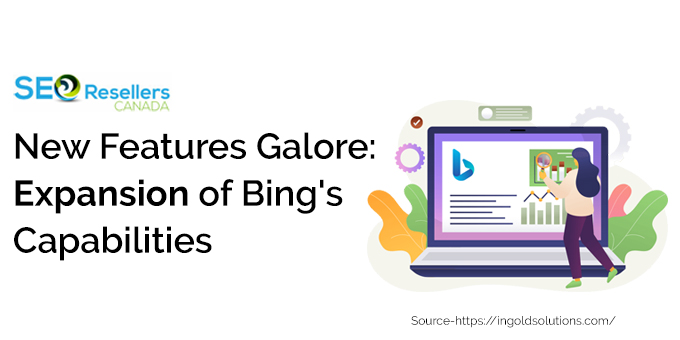
Bing has introduced sensational new features that go far beyond the imaginable conventional search engine utility. Some of these innovations are in direct response to meet today’s varied needs of users.
4.1- Virtual Assistant–Conversation Based
One of the most remarkable AI-powered features of Bing is its conversational virtual assistant. The feature simplifies everyday tasks such as bookings, reminders, and scheduling. The assistant uses conversational AI to understand natural language commands. This makes interactions with it seamless and intuitive. Unlike traditional chatbots, Bing’s assistant provides more contextual and human-like responses that streamline complex tasks with minimal effort.
With regards to other virtual assistants such as Google Assistant and Alexa, Bing offers deeper integration into the Microsoft ecosystem. It enables the user to work with Windows or Office tools much more productively. For example, a user can book a flight, set a meeting reminder, or retrieve important files all through one platform. Such functionality puts Bing in the league of virtual assistants seriously competing in this space.
4.2- Creative Text Format Generation
It enables Bing AI to create innovative forms of text like poetry, code, screenplays, and many others. Professionals, students, and businesses who want to craft unique content at a very rapid pace would greatly benefit from this feature. A digital marketing agency, for instance, can draft very compelling ad copies using AI, and the same tool would enable a student to make polished essays or even scripts.
One great real-world application is in SEO strategies, where Bing AI helps businesses create optimized meta descriptions, blog outlines, or social media content. Such functionality enables SEO companies and content marketers to elevate their online presence efficiently.
4.3- Language Translation Capabilities
With advanced neural networks, Bing can translate many languages accurately and more vividly than any other machine translation system. This feature allows global communication by bridging linguistic barriers worldwide.
Bing AI can be leveraged by businesses to localize content for international viewers, unlocking untapped markets. Thus, an SEO outsourcing firm, through the optimization of multilingual websites, can make it easy for users around the world to navigate. Case studies of selected industries, like tourism and e-commerce, reveal how the localization tool in Bing has improved the way companies interact with global customers.
With these flexible and user-centric features, Bing continues to redefine the possibilities of AI in search, making it a valuable digital ally for users across the globe.
5- Integration with Microsoft Products: Creating a Unified Ecosystem
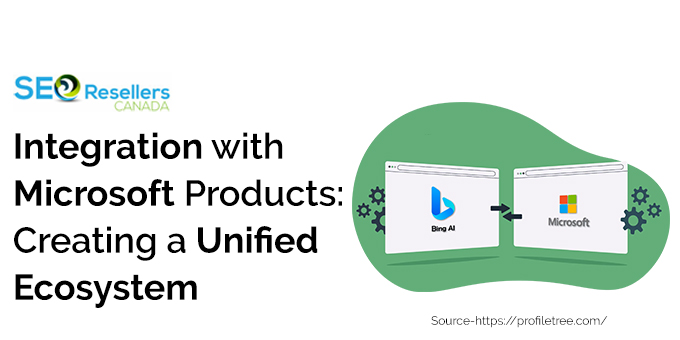
Bing has transformed itself from a stand-alone search engine into a foundation of seamless digital workflows through integration with the Microsoft ecosystem. Strategic alignment has not only made it convenient for users but also cemented the position of Bing as a critical player in the AI-driven search sector.
5.1- Connectivity
Bing has perfect harmony with other Microsoft tools, such as Edge, Windows 11, and Office Suite. It provides one platform for productive work. This search AI will be available for users in Edge and can be utilized to get the needed information in context without leaving any current task or activity. Also, Windows 11 has fully integrated Bing deeply into its search function so that users can directly access information on the desktop itself.
This interrelated structure eliminates the need for frequent app switching and lets users do things like research, communicate, and manage projects much more efficiently. Be it a content marketing team refining SEO strategies or a digital marketing agency streamlining workflows, Bing’s interconnectivity with Microsoft tools drives productivity across domains.
5.2- Default Search Engine Placement
When you make Bing the default search engine on Microsoft products, you interact with it in a natural and organic way within your digital routine. This allows for a greater reach of Bing among more users, hence expanding its market share.
For example, businesses that collaborate with SEO companies can utilize Bing AI to access the huge market of users under Microsoft. Optimizing their content for the ever-increasing number of users helps increase market share.
5.3- Unified Experience
The integration of Bing and Microsoft tools will enhance digital workflows by giving a cohesive user experience. This includes personalized search results to predictive text suggestions, enabling users to easily level up their online presence.
Bing, through its continued refinement of AI capabilities, shows how AI will help in marketing and digital transformation. This is a unified ecosystem that represents the future of AI-powered productivity for both personal and business use.
6- Market Share Growth: Bing's Rise to Prominence
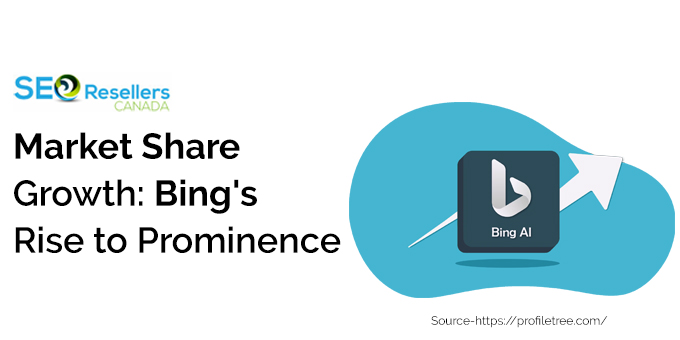
Advanced AI technologies have enhanced Bing’s market share growth. This has consolidated its position as a search engine. Industry reports indicate that its market share in the last two years increased to 35.1% in the US and 6.5% in India. This can be attributed directly to Microsoft’s strategic focus on AI-powered enhancements and an improved user experience.
6.1- Statistical Summary
The AI feature launch in February 2023 for conversational AI and creative features has led to user engagement with the Bing search AI. These advancements have not only brought in over 100 million daily users but also quadrupled the installations of the Bing mobile app. It is this tailored search experience that makes Bing AI meet the expectations of modern users and attract more people to its services.
6.2- Competitive Position
Though Google remains the dominant player in the search engine market, Bing has found its place through AI-driven features and a smooth integration with Microsoft’s ecosystem. This gives Bing a competitive advantage, which is used to target specific audience groups, such as businesses working with SEO companies and digital marketing agencies looking to upgrade their online presence.
Looking forward, Bing’s steady growth is a sign of its long-term success. With the focus on AI advancements and content marketing opportunities, Bing has emerged as more than just a search engine.
7- The Future of Bing: The AI-Driven Evolution
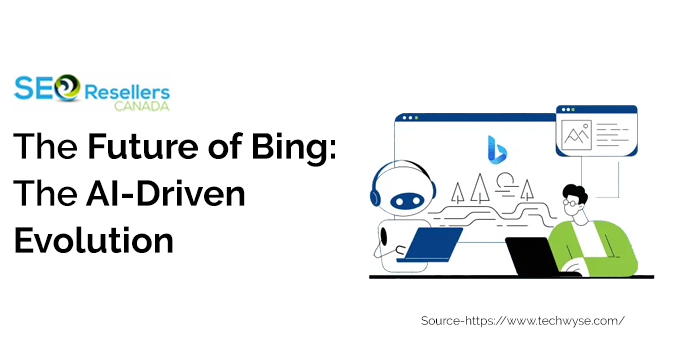
It is necessary to know how will AI impact the future, especially with continued investments in AI technologies for Bing’s evolution. As the digital scene becomes dominated by AI, the near future of Bing appears bright based on some of the incoming features of AI capabilities that are going to redefine the users’ experiences. Microsoft’s continued endeavour toward inserting advanced features into Bing AI implies that the search engine will continue to break boundaries, especially in areas such as personalized search results and predictive content.
7.1- Challenges and Possibilities
Bing has achieved great results, but it still has to compete with Google, which rules the search engine market. It is a barrier to market share, but AI-driven inventions in Bing create a chance to be a leader in the evolving digital space. The opportunity to lead in personalized and immersive search experiences that are beyond traditional search results gives Bing an edge. With a focus on AI SEO strategies 2025, Bing can address businesses seeking tailored marketing solutions and improve user engagement.
7.2- Future Vision
Looking ahead, Bing is poised to evolve into a comprehensive digital partner, offering more than just search functionality. As Bing AI becomes more advanced, it can transform into a tool for content creation and workflow optimization. For SEO companies and businesses alike, Bing will continue to offer opportunities to level up their online presence, making it a vital tool in shaping the future of content marketing and online engagement. The future of Bing will be defined by its ability to seamlessly integrate into users’ digital routines, offering immersive and personalized solutions.
8- Final Thoughts
The integration of AI has profoundly changed Bing. Features like personalized search results, conversational AI, and dynamic functionalities have vastly enhanced user engagement with Bing. It is more than a place to search and create immersive experiences.
Bing shows its commitment to innovation and AI integration, and these are two of the main trailblazers in the search engine space. The cutting-edge features set a new standard for search engines, not only offering a more personalized but also efficient way for businesses and users to navigate the digital world. For SEO companies and content marketers, Bing represents a valuable tool to level up your online presence and stay ahead of the curve.
Unquestionably, Bing has much to offer in shaping the digital search experience in the future. As it continues to evolve with AI, it is likely to spearhead innovation within the web page search market. This is the time to explore Bing’s AI-powered features firsthand to see how they unlock new levels of productivity and user satisfaction. Bing is changing, but also changing the online discovery process.
Are ready to harness the power of AI? Do you want to know how AI can help in digital marketing strategy? Connect with SEO Resellers Canada today. Our expert team can help you leverage Bing’s AI-driven capabilities to level up your SEO and content marketing efforts. We will aid ensure that your online presence stands out in an increasingly AI-driven world.















